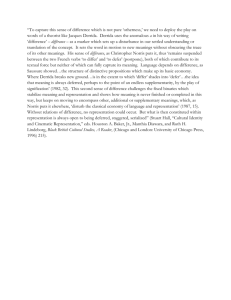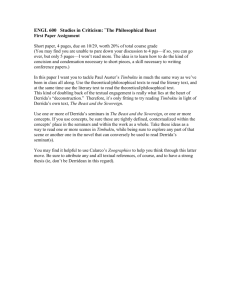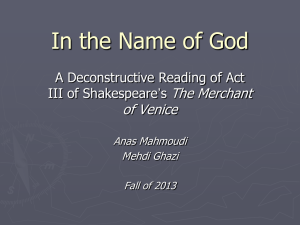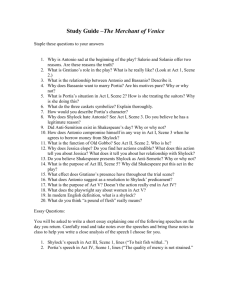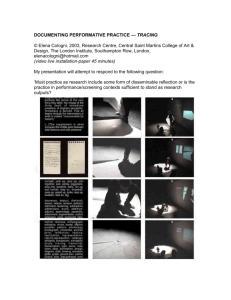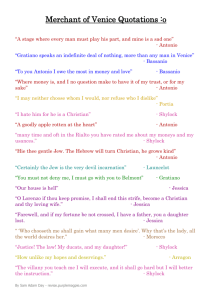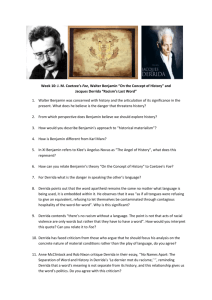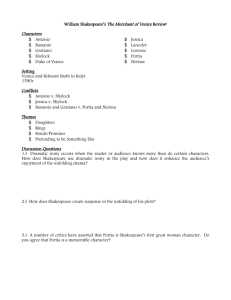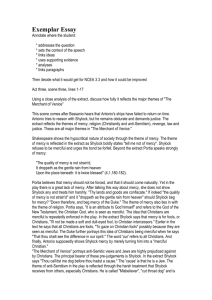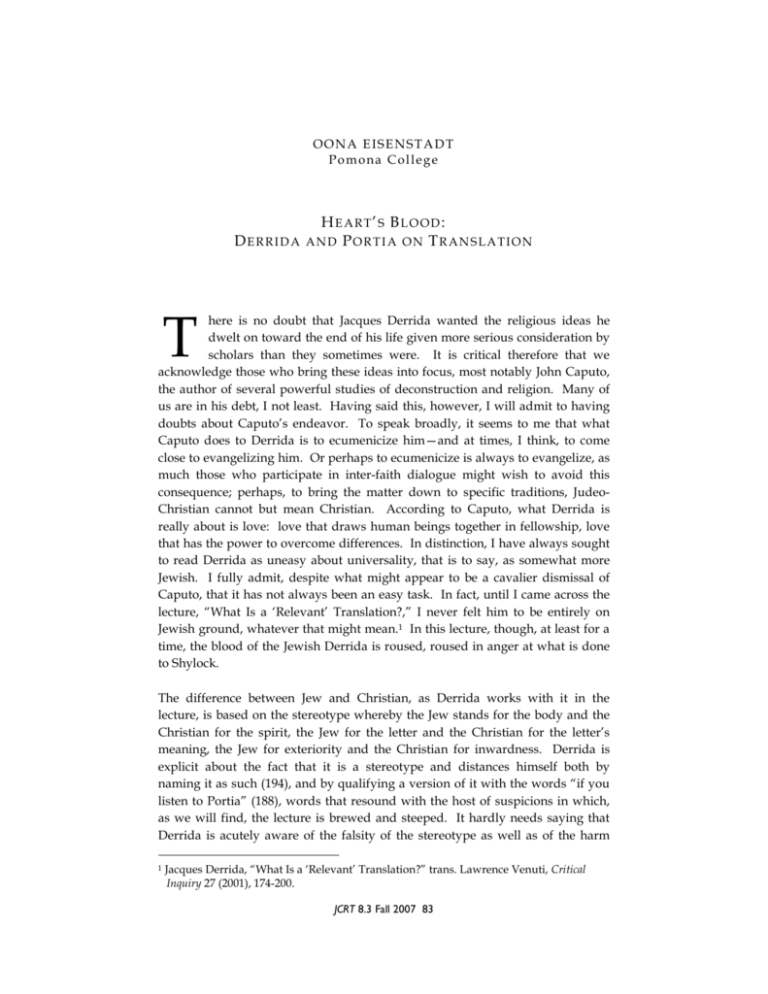
OONA EISENSTADT
Pomona College
DERRIDA
HEART’S BLOOD:
AND PORTIA ON TRANSLATION
T
here is no doubt that Jacques Derrida wanted the religious ideas he
dwelt on toward the end of his life given more serious consideration by
scholars than they sometimes were. It is critical therefore that we
acknowledge those who bring these ideas into focus, most notably John Caputo,
the author of several powerful studies of deconstruction and religion. Many of
us are in his debt, I not least. Having said this, however, I will admit to having
doubts about Caputo’s endeavor. To speak broadly, it seems to me that what
Caputo does to Derrida is to ecumenicize him—and at times, I think, to come
close to evangelizing him. Or perhaps to ecumenicize is always to evangelize, as
much those who participate in inter-faith dialogue might wish to avoid this
consequence; perhaps, to bring the matter down to specific traditions, JudeoChristian cannot but mean Christian. According to Caputo, what Derrida is
really about is love: love that draws human beings together in fellowship, love
that has the power to overcome differences. In distinction, I have always sought
to read Derrida as uneasy about universality, that is to say, as somewhat more
Jewish. I fully admit, despite what might appear to be a cavalier dismissal of
Caputo, that it has not always been an easy task. In fact, until I came across the
lecture, “What Is a ‘Relevant’ Translation?,” I never felt him to be entirely on
Jewish ground, whatever that might mean.1 In this lecture, though, at least for a
time, the blood of the Jewish Derrida is roused, roused in anger at what is done
to Shylock.
The difference between Jew and Christian, as Derrida works with it in the
lecture, is based on the stereotype whereby the Jew stands for the body and the
Christian for the spirit, the Jew for the letter and the Christian for the letter’s
meaning, the Jew for exteriority and the Christian for inwardness. Derrida is
explicit about the fact that it is a stereotype and distances himself both by
naming it as such (194), and by qualifying a version of it with the words “if you
listen to Portia” (188), words that resound with the host of suspicions in which,
as we will find, the lecture is brewed and steeped. It hardly needs saying that
Derrida is acutely aware of the falsity of the stereotype as well as of the harm
1
Jacques Derrida, “What Is a ‘Relevant’ Translation?” trans. Lawrence Venuti, Critical
Inquiry 27 (2001), 174-200.
JCRT 8.3 Fall 2007 83
Eisenstadt: Heart’s Blood
84
that has been done historically in its name. “Circumcise therefore the foreskin of
your heart,” says God in Deuteronomy 10, implying relatively clearly that the
external is a sign of something inward, the flesh of the spirit, the letter of the
meaning—and no one is more likely than Derrida to have considered the
significance of the fact that circumcision of the heart is a Deuteronomic idea
before it is a Pauline one. Why then does he employ the stereotype? At the end
of the paper I will offer what might be termed a journalistic answer to the
question, but the more trenchant answer can be offered now. It begins in the fact
that several versions of the stereotype are voiced by Christian characters in The
Merchant of Venice, such that a shallow reading holds the play as antisemitic and
only a deeper reading—one that thinks through the stereotype—reveals it as a
study of antisemitism. But this is not yet adequately radical. What we must
confront is the fact that there is truth in the stereotype. To be sure, Jews see the
letter as a vehicle for meaning. But they do not see it as a mere vehicle,
interchangeable for other signs and signifiers. On the contrary, they cherish the
letter and preserve it, returning to it after each foray into its meaning, and in this
way they enable themselves always to take new routes to new meanings. It is
perhaps the central point of Susan Handelman’s The Slayers of Moses that this is a
basic principle of rabbinic hermeneutics, in distinction to Greco-Roman and
Christian hermeneutics, and that it is also a basic principle of deconstruction.2 It
is possible on this basis to argue that, insofar as Derrida upholds the stereotype
in his lecture, he does so because there is something to be said for the external,
the flesh, and the letter. He accepts the false distinction for the sake of argument,
and signs on to the losing side.
What follows is a reading of “What Is a ‘Relevant’ Translation?” (originally
delivered in 1998 to a gathering of professional translators), supplemented by my
own thoughts. I read or translate Derrida’s lecture in a strong sense—as Gilles
Deleuze might say, I take it from behind—and therefore should acknowledge
that I bear the responsibility for the inadequacy of the following ideas to
historical reality.
Let me begin with money and flesh. Throughout the first third of his lecture—
the third that treats the topic of translation in isolation from Shakespeare’s
play—Derrida uses the opposition between money and flesh as an analogy for
the opposition between translation and a different, less assimilative model of
textual juxtaposition. Translation is exchange, property, or appropriation, in
short, transaction—and it is transaction with a remainder, such that certain
elements of the text cannot be exchanged and the translation stands in infinite
debt or absolute insolvency. At one point, Derrida attributes a spiritualized
version of this model to Cicero, Jerome, and Luther, and through these Roman2
Susan Handelman, The Slayers of Moses: The Emergence of Rabbinic Interpretation in Modern
Literary Theory (Albany: SUNY Press, 1983).
JCRT 8.3 (2007)
Eisenstadt: Heart’s Blood
85
Christian associations suggests that transactions can also be understood as
conversions. To be moved in the act of translation by the search for meaning, as
is unavoidable, is to convert. The idea of conversion, moreover, can change one’s
reaction to the remainder, for if one understands one’s transaction along the lines
of conversion, one can understand oneself, as did Cicero, Jerome, and Luther, to
be redeemed of the infinite debt created by the remainder, or relieved of the
necessity of mourning for what has been erased (180). Now, in the course of this
extended discussion, Derrida hints at a different model, one that might be
described as a ‘translation without translation,’ avoiding the undesirable
associations of fiscal transaction and conversion. What if, he asks, we ignore the
questions of grammar and of overall sense in favor of a meeting of words, a
word-to-word? In this case we can substitute an erotic understanding for our
financial one.
As for the word (for the word will be my theme)—neither grammar nor
lexicon hold an interest for me—I believe I can say that if I love the word,
it is only in the body of its idiomatic singularity, that is, where a passion
for translation comes to lick it as a flame or an amorous tongue might:
approaching as closely as possible while refusing at the last moment to
threaten or to reduce, to consume or to consummate, leaving the other
body intact but not without causing the other to appear —on the very
brink of this refusal or withdrawal —and after having aroused or excited a
desire for the idiom, for the unique body of the other, in the flame’s flicker
or through a tongue’s caress. (175)
A word, an idiomatic singularity, is licked amorously by a translator—and while
the lick makes the first word appear, there is a refusal of consummation or of
consuming: the two do not become one flesh or stand in for one another.
Here I find an allusion to Franz Rosenzweig’s classic essay, “Scripture and
Luther.” For Rosenzweig, a great translation is “a wedding of the genii of two
languages,” which is to say that, for him, the mark of the greatness of a
translation is that two languages couple.3 Moreover, Rosenzweig—and please
forgive me for summarizing in absurdly broad terms—links these couplings to
the march of history toward homogeneity, to what Benjamin calls pure language,
to the erasure of difference, to the global triumph of Christianity, and, via Luther,
to a pax Germanica. Thus in short, to understate the case, Rosenzweig is uneasy
3
Franz Rosenzweig. “Scripture and Luther,” in Martin Buber and Franz Rosenzweig,
Scripture and Translation, trans. Lawrence Rosenwald with Everett Fox (Bloomington:
Indiana University Press, 1994), 47-69, 53. One of the questions at stake for Rosenzweig,
the distinction between fidelity to the sense and fidelity the letter, is also central to
Derrida, though he mentions Luther only as following Jerome in favoring the sense. On
Rosenzweig’s essay, see my “Making Room for the Hebrew: Luther, Dialectics, and the
Shoah,” The Journal of the American Academy of Religion, 69.3 (2001), 551-575.
JCRT 8.3 (2007)
Eisenstadt: Heart’s Blood
86
about the business of languages getting into bed with each other. Derrida
appears uneasy as well. For him the assimilative model of coupling remains tied
to financial transaction and conversion, mercenary and dubious. But he appears
to think the business is avoidable with the amorous lick of tongue on word
leading to no consummation; it is as though sex were money but the kiss pure.
The amorous lick—the fleshy model opposed to the financial model—is not
translation, but something like it, and it avoids translation’s pitfalls by
multiplying rather than reducing meanings.
These thoughts are, for Derrida, intimately bound up with The Merchant of Venice,
which appears in his lecture not as an example, but as a theory of translation in
dramatic form. Four of the play’s essential themes are also essential features of
translation. (1) All translation involves an oath—doomed to be broken. (2) All
translation involves an economy—of absolute insolvency. (3) All translation
involves conversion. (4) And finally—and here we lay aside the two models,
based one on money and the other on flesh, for a meta-model—all translation
involves a transaction of money for flesh, such that flesh is “the unique
literalness of a proper body” and money is “the arbitrariness of a general...
fiduciary sign” (184). Leaving aside the oath (with which I will not deal), what is
critical in all of this is the relationship between the binaries Jew/Christian and
flesh/money. The conversion of the Jew, Shylock, to Christianity is, for Derrida,
representative of the historical shift that was the original Christian translation of
Jewish letter to Christian spirit, and can also be understood as a transition from a
Jewish fleshy understanding to a Christian monetary one. The hallmark of
Christianity is a certain translation; the hallmark of the Jew— evident when
Shylock, (a) holding to the letter of the contract rather than its sense, and thus (b)
refusing to be paid money in lieu of flesh—is a resistance to translation, to a
certain understanding of translation.4 The resistance cannot perhaps emerge
4
This insightful piece of analysis may remind us of Emmanuel Levinas’s interpretation of
the biblical law: an eye for an eye. Levinas begins with a defense of the surface meaning
of the text as intended to call a halt to vengeance and feud: an eye for an eye means:
only an eye and no more. Because this still appears rather brutal, he shifts to the classical
rabbinical reading of the spirit of the law, whereby “eye for eye means fine.” Here we
have a spiritualization in the form of a conversion to the monetary realm, or translation
of flesh to money. But this is inadequate for Levinas. “For it leaves a way open for the
rich! They can easily pay for the broken teeth, the gouged out eyes and the fractured
limbs left around them.” And, the problem, as he points out, only begins in class
distinctions; the deeper problem is that a victim’s suffering might ever leave no
comparable mark on the perpetrator; the problem is that any perpetrator might walk
away with a “light heart and a healthy body.” Thus we turn back from the spirit to the
letter—not to put it literally into effect, for the realm of effect is the realm of the spirit,
but for what it reminds us of. “Neither all eternity, nor all the money in the world, can
heal the outrage done to a man. It is a disfigurement or wound that bleeds for all time,
as though it required a parallel suffering [eye for eye] to staunch this eternal
hemorrhage” Here Levinas shows the ethical implications of holding to the letter rather
than the sense, and refusing to pay or be paid money in lieu of flesh. Emmanuel
JCRT 8.3 (2007)
Eisenstadt: Heart’s Blood
87
historically in any other form than complaint about the lack of general lack of
lament for the remainder. “The relève,” says Derrida (using a term that will
become critical to him later on and for now can mean: what has become
irrelevant that we would like to lift back into prominence)—“the relève... will be
precisely what happens to the flesh of the text, the body, the spoken body and
the translated body—when the letter is mourned to save the sense” (184).
Derrida’s interpretation of the play treats only Act IV. Along the way he makes
it clear that he understands Portia’s courtroom moves as unethical entrapment—
the mercy speech is a “pretense,” a “ruse to empty his pockets while distracting
him, to make him forget what he is owed, and to punish him cruelly” (188)—and
he makes it clear also that Portia’s ruse reveals something rotten in a certain,
perhaps historically dominant understanding of Christianity: he has been, he
says at the end of the piece, “expressing all the evil that can be thought of the
Christian ruse as a discourse of mercy” (198). In these statements the
foundations of his argument appear to be clear and pleasingly provocative.
He begins his close reading two lines before the mercy speech, with Portia’s
“Then must the Jew be merciful.” Derrida is rather grand on these words. The
Christian who says them, he tells us, is at this moment equivalent to Christianity
or the Christian State, and the Jew who hears them is all Jews; the line
“recapitulates the entire history of forgiveness, the entire history between the Jew
and the Christian, and the entire history of economics... as a history of
translation” (186). As part of his explanation of how, he reminds us of some
words said by the last Pope—John-Paul II, whose papacy was marked by endless
apology for the sins of the historical church—and who, responding perhaps to
someone’s complaint about the lack of lament for the remainder, said with a sigh,
“I notice that it is always we who are asking for forgiveness” (187). Portia may
or may not notice that it is always the Christians who are asking for forgiveness,
but she nevertheless asks for it in a way that characterizes the logic of two
millennia of Christian-Jewish relations as well or better than the Pope, for her
“then must the Jew be merciful” means: we have confessed, therefore you must
forgive; we have asked for forgiveness, you must give it. There is compulsion
here, as Shylock points out—“on what compulsion must I?” he asks. In response
we have the mercy speech, in which Portia explains mercy as the ultimate
compulsion, the ultimate power.
To be sure, she does not begin this way. She begins by conceding Shylock the
point: mercy is entirely without compulsion. But where he seemed to be harking
at the commonsensible idea that mercy involves uncoerced leniency in the
application of the law, what Portia does is to untie mercy from legal compulsion
Levinas, Difficult Freedom: Essays on Judaism (trans. Sean Hand, Baltimore: The Johns
Hopkins University Press, 1990), 146-8.
JCRT 8.3 (2007)
Eisenstadt: Heart’s Blood
88
entirely and allow it to float off into the ether. It becomes a quality unto itself,
specifically the quality that identifies kings and gods, such that the one being
merciful or offering forgiveness is “on high, very high, above the person who
asks for or obtains forgiveness” (192) and the one asking for it is far below—this,
perhaps, is what causes the Pope to sigh. It is not difficult to see that, once
detached from justice, mercy becomes trump suit in the game of power: “since
[mercy] is a might without might,” it is “mightier than might,” (188), since it
undoes power, it is a power more powerful than power; it is a freedom from law
which carries a restraining force far greater than that of the law. It is this power
that Portia offers to Shylock, thus attempting already, according to Derrida, to
convert him: to translate him into a Christian with all the advantages of
Christian noblesse oblige. Or rather, she does not offer, she compels—and this
compulsion of what cannot be compelled, this forcing of superior power, is the
flag that marks her “offer” as a trick, a prelude to the forced conversion to come.
Shylock is more or less aware; he sees the presentation of a privilege that will
strip from him all he holds dear, and he sees the compulsion as well; or, if he
does not lay it out to himself in these terms, at least he “senses that [the speech]
is an attempt to steer his ship in circles... senses that he is in the process of being
had” (188). He refuses; the perverse command to become high is withdrawn;
and, as the upshot, he is forced onto his knees to beg mercy for himself.
Derrida calls the moment in which Shylock is told to get down and beg for mercy
“scandalous” (189). He is not in an appropriate theologico-political position to
sigh, and say that he notices it is always we (Jews) who are asking for
forgiveness. But he does spend a few moments on the episode —that is, the
sentencing—in which we return from the grand use of mercy as a tool of
historical power to a more down-to-earth equation of mercy and money.
Shylock, says the Duke, must show humility in order to have the penalty to the
State reduced to a fine—here the Duke calculates spirituality in gold. What is
more, the Duke pardons Shylock in order to show his superior generosity as a
Christian; he then he threatens to retract the pardon unless Shylock becomes a
Christian too. Shylock, however, responds with another refusal: “nay, take my
life and all, pardon not that”; which is to say that, just as Shylock has refused to
participate in Portia’s ruse by doling out mercy, he now refuses to ask mercy,
and, indeed, tries to refuse to receive it. This is, Derrida suggests, his finest
moment, the moment in which he “calls himself a foreigner to this entire
phantasmic tale of forgiveness,” to this “Christian and theologico-political
preaching that tries to pass the moon off as green cheese” (190). But now
Shylock is compelled again, and this time the true coercive force of mercy is laid
bare and he cannot but submit. Forgiveness is forced down his throat, his life is
pardoned against his request. And he is fined to the extent of his holdings. The
JCRT 8.3 (2007)
Eisenstadt: Heart’s Blood
89
theatre of forgiveness always hides an economy, says Derrida; mercy is always
mercenary.5
What Derrida has done in the lecture to this point is essentially to de-translate,
amorously licking Shakespeare’s play until the process of translation as
transaction and conversion appears. Much more of this can be done. I now turn
away from Derrida’s analysis for a time, and offer a series of supplementary
interpretive points. These points are my own, but they were deepened for me by
an encounter with Derrida’s argument so far, and I believe they also provide
further textual support his argument.
Let me begin with Portia as the translative figure par excellence. In the mercy
speech, as Derrida points out, she becomes the agent of the historical theological
movement of translation. But we can note that regularly she translates in a
simpler sense. One of her conversational habits is to take something someone
else has said and tart it up. In a typical exchange, Nerissa says, “when the moon
shone we did not see the candle”; and Portia responds: “So doth the greater
glory dim the less./ A substitute shines brightly as a king/ Until a king be by,
and then his state/ Empties itself, as doth an inland brook/ Into the main of
waters” (V.1.92-7). Perhaps one of the purposes of Shakespeare’s invention of
Bellario is to point up this quality in Portia. In the Italian story on which
Shakespeare draws for the courtroom scene, the nasty lady comes up with the
casuistry herself; Portia, in distinction, consults with the learned Bellario and
perhaps only polishes what she’s been given—here Shakespeare translates his
source text to make Portia the agent of this kind of translation. One could note as
well that the mercy speech can be understood as a prettified extension of
Shylock’s response to her self-contradictory “then must the Jew show mercy.”
His “on what compulsion must I?” provides her image of un-coerced mercy on
which she elaborates; she translates Shylock’s words into pompous Portia-ese as
a prelude to translating mercy back into compulsion and Shylock to
Christianity.6
We can see this also in a textual link not mentioned by Derrida. When Portia says that
mercy rains down from heaven, she alludes to manna. But the manna that rains down
in this play is money, for when Nerissa gives Lorenzo “From the rich Jew, a special deed
of gift,/ After his death, of all he dies possessed of,” Lorenzo responds, “you drop
manna in the way/ Of starved people” (V.1. 292-4).
6 Portia’s pomposity is naturally linked to an enormous ego; this emerges amusingly at
several points where she gussies up the words of others. Take, for instance, the example
just offered from Act V. Nerissa suggests that the light from Portia’s house is dimmed
by the moon. This won’t do at all, and Portia’s translation makes the correction: Portia,
the ruler of the house, is the light that dims the glory of her substitutes, Lorenzo and
Jessica.
5
JCRT 8.3 (2007)
Eisenstadt: Heart’s Blood
90
Much more importantly, there are two critical acts of translation in the play that
Derrida does not discuss. The most central is the translation from one allegorical
interpretation of the passion narrative to another in the courtroom scene. By the
first, Antonio stands as our Christ. Having done nothing immoral he is put on
trial; he refuses to speak in his own defense (IV.1.80-83); he is not actually killed
since the play is a comedy, but he is certainly resurrected and returned to us,
better than ever, and empowered now to act as a judge of men and champion of
the spread of Christianity—Christ as ruler in heaven. By this account, Shylock is
the Pharisee or the Jewish mob responsible for the event—“My deeds upon my
head,” cries Shylock, echoing the cry of the Jewish mob at the crucifixion (Matt.
27:25)—and Portia can take her place as the angel or Holy Spirit who effects the
resurrection. The second allegorical match-up of courtroom scene with passion
story is, however, more compelling. This one places Shylock in the role of
Christ—he is, after all, the one who is finally on trial here, and the one who is
actually doomed. Portia is the Pharisee both insofar as she betrays him and
insofar as she acts the merciless master of legal hairsplitting, and Antonio is
relegated to the role of Barabas, the other fellow on trial, the one who is rescued.
We can fit more elements into this scenario than into the last, notably Gratiano,
who leads the mob in calling out for the death of the Christ-Shylock, and the
Duke, in the role of Pontius Pilate, with the life and death of the Christ-Shylock
in his hands. In the translation between the two allegories Shakespeare is
playing with his audience. We might think the first allegory is truer because the
Christians and Jews are in the right roles (always accepting a non-Jewish Christ,
and to many this is more than acceptable).789 But in fact the second, with the
roles reversed, is closer to representing what actually happens in the court. It is
with this translation, I believe, that the play is revealed to be an examination of
how easy it is to be swayed against the facts by a set of illusory images, that is to
say that rather than being an antisemitic artifact, it is revealed as an
extraordinarily sophisticated account of antisemitism. Here, in other words, we
have the proof of Derrida’s statement that Shakespeare “has been charged with
anti-Semitism for a work that stages with an unequalled power all the great
Susannah Heschel argues, in an article drawing in some measure on Derrida, that the
courtroom scene functions to raise the question of the Jewishness of Jesus, in a way that
will cause audiences unease; her conclusion is that the play “can be read as anti-Jewish
or as anti-Christian, critical of Christianity’s anti-Judaism.” I tend to agree that this is
the alternative, and also find interesting the main line with which she supports her
argument, namely an account of why Shylock, even after conversion, will never be
understood as a Christian in a proper sense, since Jewishness “could pollute the body of
Christendom with Jewish converts.” “From Jesus to Shylock: Christian Supersessionism
and ‘The Merchant of Venice,’” Harvard Theological Review, 99 (2006), 407-431.
8 Marc Shell argues that Antonio is not Jesus, but might be performing an “un-Christian
and presumptuous imitation” of him. Literary and Theological Economies From the
Medieval to the Modern Era (Berkeley: University of California Press, 1982), 78n.54.
9 Marc Shell also notes the incidence of this imagery, and relates Portia’s distinction to
Shylock’s violation of the laws of kashrut in eating with Antonio, Shell, 69n.40.
7
JCRT 8.3 (2007)
Eisenstadt: Heart’s Blood
91
motives of Christian anti-Judaism” (191). That the first allegory, the one
involving an imperial Christ, continues to be more obvious to audiences of the
play is a tragic difficulty.
The second major act of translation not discussed by Derrida involves flesh and
blood. One can easily be caught up by the flesh/money binary such that one
forgets this more visceral distinction, which is not itself a translation but a
ground for translations. One such translation is the main plank in Portia’s legal
case: the translation of the word “flesh” (which is understood common-sensibly
in the play to refer to flesh and blood) to blood-less flesh: this move being the
precise parallel of her translation of the word “justice” (understood commonsensibly to refer to a justice that already inscribes mercy) to mercy-less justice,
such that the two words are now at odds with one another and the mercy of
which she speaks is something in another realm from the justice which she metes
out. But another even richer act of translation grounded in the flesh-blood
binary arises at the same moment: a translation between the doctrinal language
of the Jew and that of the Christian. For who is it that separates flesh and blood,
and in what circumstances? When Portia turns the case with the distinction,
Shylock surely hears the laws of kashrut: you may eat the flesh but not the blood.
Portia suddenly presents a picture in which Shylock is a butcher or shochet and
Antonio meat—but of course any shochet knows you can only squeeze the blood
out after the animal is dead, and Antonio is palpably alive. The incidence of
flesh-blood separation in a live animal occurs, in fact, in the other doctrinal
language: this is Jesus at the last supper, holding in one hand the wine that
represents his blood and in the other the bread that represents his flesh. In other
words, the meal Portia has laid before Shylock in Antonio may appear to be
kosher meat but is actually the communion—a meal Shylock will no doubt have
to eat many times before he dies.
These two acts of translation are linked. In the first half of the trial scene,
Antonio appears to be our Christ; he is the one on trial, the one who will be
sacrificed—and, from another perspective, he appears as meat held out for the
knife of the butcher Shylock. At the point when Portia turns the case, when she
demands that flesh be separated from blood in a live animal, she not only
initiates the translation from the Jewish doctrinal language to the Christian one,
she also inaugurates the second allegorical interpretation of the passion
narrative, putting Shylock on trial, ensuring that he is one to be sacrificed.
Shylock is not capable of hearing the doctrinal translation in Portia’s words:
there can be little doubt that the eucharist never occurs to him, for he cannot
possibly anticipate Antonio’s demand for his conversion. And yet the demand
has already been made; the translation/ conversion is on the table from the
moment Portia demands that Shylock separate flesh and blood in a live animal,
from the moment she demands, in other words, that Shylock play Jesus. In fact,
JCRT 8.3 (2007)
Eisenstadt: Heart’s Blood
92
the associations involved in her mockery are even more complex than this. Jesus
separates his own flesh and blood while Shylock is being asked to separate
Antonio’s; he is being asked, in grammatological terms, to translate a reflexive
construction into a transitive one, and in theological terms, to split the role of
Christ with Antonio such that Shylock does the work, separating flesh from
blood, while Antonio remains the central object, the one whose flesh and blood
are significant, the embodiment of the sacrament. It’s an odd game she’s
playing, and it’s only effective because it shows up Shylock’s failure: flesh can’t,
in reality or in life, be separated from blood, or, at any rate, the Jew is incapable
of performing the miracle. But her mockery backfires when Shylock’s messianic
role is reasserted. For when he is not able to reproduce Jesus’ act at the last
supper, she takes him straight to the cross.
In order to understand what is at stake in the translation from the Jewish
doctrinal language to the Christian one, we must look at the figure of Jessica. I
believe, in fact, that without consideration of Jessica it is impossible fully to
understand Shylock’s resistance to translation, for she is the site of his fidelity
and the ground on which he stands when he refuses to be caught up in the
convolutions of mercy. It is surely the elopement of Jessica, above all else, that
moves Shylock to make the “merry jest” serious; for the elopement must make it
seem to him that the bond was contracted in the first place with the main intent
of getting Shylock out of the house, at table with Antonio, so that Jessica could be
stolen. Jessica taken, Jessica converted, Jessica corrupted into a thief: though one
may quibble about whether Shylock’s intentions become deadly only after the
elopement, there can be no doubt that his daughter is foremost in his mind
through everything that follows.
In this light, what we have in the trial scene is serious play with the union and
separation of flesh and blood: (flesh and blood) vs. (flesh) and (blood)—play that
also involves other forms of union and separation, and life and death. In sum: in
stealing Jessica, the Christian characters have stolen Shylock’s flesh and blood;
in return he threatens to take the flesh and blood of Antonio; the Christians
wrest flesh and blood apart to win the trial; and they force this separated flesh
and blood down his throat for the rest of his life. For the Jew, flesh and blood
remain together; in Shylock’s relation to his family, his flesh and blood, and in
his interpretation of the bond in the trial scene, these things must not, cannot in
life be separated. The Christians, in distinction, separate what must be joined—
flesh from blood, father from child. And to separate what must in life be joined
is to deal in death. It might indeed be possible to argue, using Derrida’s
correlation between transaction and conversion, that the act finally performed on
Shylock, the filching of his wealth, can also be read in the two doctrinal
languages: for when the money is squeezed from the man, the spirit from the
proper body, the blood from the flesh, the Jew sees the act as a slaughter while
JCRT 8.3 (2007)
Eisenstadt: Heart’s Blood
93
the Christians see it as a sanctification comparable to the eucharist. What is
more, Derrida’s categories make it clear that the eucharist itself is not merely a
translation of Jewish dietary law into a new sacrament, but a translation into
translation. When wine is translated into blood it is not a transaction of thing for
thing, but of thing for metaphor. When Jewish ritual food is translated into
Christian, it is not a transaction of one food for another, but of food that remains
food for food that becomes a sign—food that becomes, in the terms Derrida lays
down early in the lecture, money. Here once more we have Jewish text
overcome by Christian translation.
My last footnote to Derrida is this: though he regards the play as an examination
of antisemitism, he does not mention the many times where Shakespeare attacks
the stereotype that Derrida rightly sees him working with. For instance, while it
is perhaps a stretch to pull Shylock out of the role of shochet and place him into
the role of mohel, if it can be done then the Jew’s attempt to circumcise the heart
of the Christian is a reminder that this imagery is Deuteronomic before it is
Pauline. For another, the Jews in the play never speak of their Jewishness as
something bodily, while the Christians do: this is the point of all Launcelot’s
joking with Portia over whether she’s a bastard—since she’s kind, her mother
must have played false; Christian kindness runs in Christian blood and
Christian semen—and Portia too mentions “Christian blood,” not one drop of
which should be spilled (IV.1.408). A third much longer instance. Derrida takes
the binary Jew/Christian, relates it to letter/spirit, and thence to flesh/money. It
is a clever move, this linking of Christianity to money via translation, a move
that works with one stereotype, Jews as literalists, to overturn another, Jews as
financiers. But he does not point out that Shakespeare has already, in a more
literal way, overturned the latter stereotype, by placing all the characters in the
play on a similar financial footing. Shylock is a usurer, or, in effect, a bank.
Antonio is a mercantilist, import/export; he sends out ships to buy and sell at a
profit. Bassanio is a venture capitalist: he uses other people’s money; he sells;
he sells sales; and (as when, in Belmont, he puts on a show of wealth he admits
he does not have) he is not above selling himself. And finally Portia is Old
Money, which naturally Bassanio, the venture capitalist, wants to marry. There’s
a financial continuum here that is echoed and represented in the line of lending:
from Tubal to Shylock to Antonio to Bassanio; Jew to Jew to Christian to
Christian. What’s more, not only do the Christian characters, like the Jew, make
their money from money, they think about it and talk about all the time. The
first we hear of Portia, for instance, is a long description given by Bassanio to
Antonio of how marriage to this “golden fleece” is going to clear him of all his
debts. Is Shylock the stereotypical rich Jewish miser? But everyone in the play
deals in money, and Shylock’s trade has the lowest profit margin. Do Jews
habitually charge interest? Not in this play, where no one charges anyone
interest: not Tubal to Shylock or Antonio to Bassanio—and not Shylock to
JCRT 8.3 (2007)
Eisenstadt: Heart’s Blood
94
Antonio either, for the bond has a penalty but no interest. Is the idea of flesh for
money a Jewish idea? But Venice is a slave-owning society—they trade flesh for
money every day—and of all the central characters we only know for certain that
Shylock owns no slaves. Do the Christians embody the ideal of romantic love?
But the match of Bassanio and Portia begins, on his side, in a desire for her
money, and, is marked, on her side, by an unwillingness to leave her father’s
money behind; indeed Jessica is the only one in the play who is willing, for the
sake of love, to do what is called for by the inscription on Portia’s casket, to give
and hazard all she hath. Derrida’s point that Shakespeare lays bare the Christian
process of translation can be supplemented by an understanding of the extent to
which Shakespeare also de-translates.
Before taking up Derrida’s last argument, I want to return briefly to John Caputo.
In The Prayers and Tears of Jacques Derrida, Caputo asks (with reference to various
passages in The Gift of Death) whether Derrida does “not risk widening the war
between Christian and Jewish readings of the akedah?” He answers in the
negative: Derrida’s intention is “finally to displace the opposition between
Christian and Jew, between the determinate, identifiable messianisms, in the
name of a messianic structure to which they all subscribe.” Perhaps this is true.
Or perhaps it bespeaks what Derrida elsewhere calls “a wide-eyed
ecumenicism.”
And perhaps—to revisit the place I began—like many
ecumenicisms, it hides something else, albeit unseen and unintended. On the
same page, Caputo explains that part of the movement from determinate to nondeterminate messianism is “reversing the most dangerous stereotype of all, the
Jew as the pharisee, as the money changer, the ruthless creditor, Shylock.” Now
certainly Caputo holds no such stereotype. But his list may remind us that when
we move to non-determinate messianism we give certain things up: not just the
pharisee but also, surely, the Pharisee; not just the ruthless creditor but also
Shylock. Are we not back on Shakespeare’s turf, with Caputo placing Derrida in
the role of Portia? Caputo is appalled by Christian attempts to convert Jews to
the “Religion of Love,” but has no problem with the deconstruction of everything
“Shylockian”—or with its dissolution into the non-determinate.10
It seems to me that “What is a ‘Relevant’ Translation?,” which was originally
delivered around a year after Caputo’s book appeared, cannot but be understood
to constitute, at least in part, a response. The main thrust of the lecture appears
to me to offer a gentle correction: a reading of Shylock as something other than a
ruthless creditor, a mode of argumentation that is reminiscent of the historical
Pharisees, the rabbis of the classical era, to whose central text, the Talmud,
Derrida is always in debt and, above all, a championing, even perhaps at the
expense of some truth, of at least a part of the stereotype Caputo says all his
10John
Caputo, The Prayers and Tears of Jacques Derrida: Religion Without Religion,
(Bloomington: Indiana University Press, 1997), 218.
JCRT 8.3 (2007)
Eisenstadt: Heart’s Blood
95
work overturns. In short, Derrida addresses Caputo, complicating the problem
to which Caputo refers with an indirect but strongly expressed unwillingness to
be translated into Portia. But all of this holds only until Derrida makes his
culminating argument, translating Portia into Hegel. To this we now must turn.
The high point of the mercy speech is: “And earthly power doth then show
likest God’s/ When mercy seasons justice.” We have here human power
described as a modeling or perhaps an immanentization of divine power, and
connected to a certain seasoning. Hugo translates the word “seasons” as
“tempère” such that in the common French translation, mercy tempers justice.
Derrida praises this translation, but has another word to suggest: relève. Relève
has many meanings, one of which is to elevate, to lift back up, and another of
which is to relieve, as in the changing of the guard. But the one Derrida wants to
focus on has to do with cooking (perhaps specifically French cooking). When
you relève a stew (or a daube), you add a spice that makes the flavor of the stew
different, but in such a way that you make it taste more like itself, bringing out
the natural flavor. Portia, understood this way, is claiming that mercy comes
into the stew of justice, at once elevating it and making it what it is—that is,
mercy changes and lifts justice, making it more just. The relève-ing agent is
destroyed in the stew; it might perhaps be a lost remainder, but at the same time
it has done its work and, like a relieved guard, it is fulfilled in its replacement,
preserved in its erasure, or, in words Emmanuel Levinas might have used,
conveyed in the form of its betrayal. It is not hard to see that with this word,
relève, we have moved into Hegelian territory, and, in fact, Derrida now reminds
us that he used this word in 1967 amorously to lick the German Aufhebung,
previously understood to be an untranslatable term referring to the critical
moment in Hegel’s dialectic—the movement by which the relevance of a thing is
established as it is interiorized and sublimated. And, finally, the punch line: the
critical Aufhebung for Hegel is mercy, such that “the movement [of the dialectic]
toward... absolute knowledge as the truth of the Christian religion passes
through the experience of mercy” (197). In sum, Hegelian-Christian godliness,
like the godliness of which Portia speaks, involves a dialectic in which mercy
appears as a moment sublimated in a horizon of salvation and power. The
dialectic in history and consciousness is also, says Derrida, “the sublime
greatness that authorizes... every ruse and vile action that permit the lawyer
Portia, mouthpiece of all Shylock’s Christian adversaries... to get the better of the
Jew, to cause him to lose everything, his pound of flesh, his money, even his
religion” (198). This is, moreover, the dialectic we have seen at work in
translation understood as transaction and conversion, translation that lifts “the
signifier to its meaning or value, all the while preserving the mournful and debtladen body of the singular body, the first body, the unique body that the
translation thus elevates, preserves, and negates [relève]” (199).
JCRT 8.3 (2007)
Eisenstadt: Heart’s Blood
96
That is the whole picture. But what it means is not entirely clear. What is the
remainder that is preserved by its negation? Is it mercy? Perhaps. For it appears
that the more one tries to make mercy operate as a thing in itself, outside of
justice, the more it operates as a moment in the dialectical game. Thus it is
possible that the culminating point of Derrida’s lecture is a lament over the
impossibility of mercy, an impossibility that is augmented both despite and
because of mercy’s necessity. And yet there is about all of this an aura of
fatalism, a vague cast of Derrida’s having made his peace with the dialectic, with
conversion, and with the impossibility of mercy; and while this kind of fatalism
might be characteristic of deconstruction, which often seems to exist in the mode
of a complaint that must be ineffectual if it is not to become monstrous, it does
not sit well with the forceful anger of much of Derrida’s analysis of the play.
Could it be, then, that Shylock is the remainder to be mourned? For it is Shylock
who, most concretely, is preserved by being erased in the Venetian stew, Shylock
whose “singular body” is in question; indeed, Shylock is the only figure fitting
Derrida’s description of what we mourn: “the singular person... the ‘who’
irreducible to the essential quality of a divinity,” the one who is “effaced” in the
dialectical process (197). But in this case the fatalism of the dialectic takes on
even an more disturbing nuance, such that the Jew’s conversion is inevitable, the
Jew exists only as what-is-to-be-mourned, the Jew is relegated to the role of a
spice in the stew of Christian modernity. This understanding, which perhaps
owes something to the third part of Rosenzweig’s The Star of Redemption, is
immensely problematic. It may be that Derrida is angry not so much at
Shylock’s conversion as at the necessity of that conversion. If this is the case,
then the ecumenical thrust Caputo draws from Derrida’s other works holds in
this lecture as well: we are all one, all in the same daube. Only perhaps Derrida
is not entirely happy about it.
I myself am more than unhappy about it, more than unhappy that Derrida’s
discussion of the Aufhebung reopens a door to a dialectical ecumenicism in which
the Jew and the Christian take their places, dissolved in a stew of nondeterminacy. I have attempted to show that translative acts come at the cost of
the union of flesh and blood in human life; I have attempted, in other words, to
show that I am not sure Derrida’s final move is necessary, and that I think
perhaps Shakespeare, on his own terms, already offers excellent address to
Caputo. In any case, Derrida and Caputo’s exchange, like Shakespeare’s text,
recapitulates a certain history of religions and translations.
OONA EISENSTADT is assistant professor of Religious Studies at Pomona
College. She is the author of Driven Back to the Text: The Premodern Sources of
Levinas’s Postmodernism (Duquesne, 2001) and several articles on Levinas,
Rosenzweig, and Derrida.
JCRT 8.3 (2007)
Eisenstadt: Heart’s Blood
97
© Oona Eisenstadt. All rights reserved.
Eisenstadt, Oona. “Heart’s Blood: Derrida and Portia on Translation.” Journal for
Cultural and Religious Theory vol. 8 no. 3 (Fall 2007): 83-97.
JCRT 8.3 (2007)

